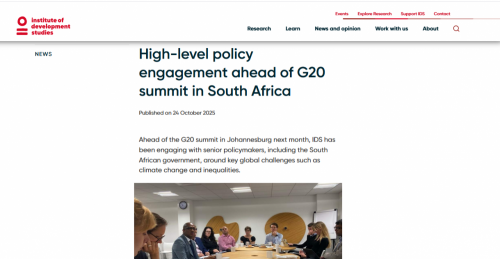
https://www.ids.ac.uk/news/high-level-policy-engagement-ahead-of-g20-sum...
South Africa is the first African nation to hold the presidency of the G20 and chose Solidarity, Equality and Sustainability as its priority theme for the 12-month term. As part of the focus on equality, President of South Africa Cyril Ramaphosa has commissioned an “Extraordinary Committee of Independent Experts” led by Joseph Stiglitz, to deliver the first G20 report on global inequality.
Tackling global inequality
The Committee and its task of assessing the impacts of extreme wealth inequality and how it can be reduced was a topic of a roundtable meeting convened in London last week with Mr Kenneth Morolong MP, Deputy Minister in The Presidency of the Republic of South Africa. It was the latest in a series of events co-hosted by IDS and the New Economics Foundation (NEF) about the G20, attended by academics, thinktanks and NGOs to discuss South Africa’s G20 leadership and current multilateral challenges.
Peter Taylor, Director at IDS summarised the discussion, highlighting that a range of issues were raised as having relevance for G20 discussions around multilateral cooperation: debt; borrowing and investment; global fund replenishment; addressing inequalities; inclusive trade and technology and anti-corruption efforts.
For South Africa as hosts, the Deputy Minister shared the country’s ambitions for the G20 and how it is an opportunity to reclaim and reimagine multilateral cooperation and solidarity. There was also discussion around South Africa’s position as a bridge between global North and South and its desire to reduce global fragmentation and increase cooperation, during the G20 year and beyond. With the aim to see tangible, trackable policy wins, implemented in ways that change people’s lives, with clear targets relating to equity and sustainability – in line with South Africa’s G20 priorities.
Opportunity for South Africa to lead inclusive energy transitions
With sustainability and climate change at the forefront of this year’s G20, IDS has shared new evidence to support South African leadership of an inclusive clean energy transition, fuelled by small and medium sized businesses. The evidence was presented at an official T20 side event in Johannesburg on Friday 17 October, hosted by IDS in collaboration with The Institute for Economic Justice, as part of Clean Energy for Development: A Call to Action (CEDCA). The research and evidence supported a discussion on how South Africa could lead a multilateral push within the G20 to turn green energy principles into concrete policy action. This included how to unlock the potential of small and medium businesses and entrepreneurs in an inclusive clean energy transition.
The event was opened by James Christoff, High Commissioner for Canada in South Africa, with a keynote address from Devan Pillay, Head of Employment Strategy at the Presidential Climate Commission.
“A just transition must be more than an energy shift”
Speaking at the T20 event titled ‘Unlocking the Potential of Small and Medium Businesses and Entrepreneurs in the Clean Energy Transition’, Christoff called for the G20 to “move from principles to practice, and from ambition to implementation.”
“A just transition must be more than an energy shift,” he said. “It must be a whole-of-society, whole-of-economy transformation—one that leaves no one behind.”
Christoff emphasised that small and medium-sized enterprises (SMEs) and women-led businesses are critical to powering climate-resilient development. He added “If the G20 acts decisively, the ripple effects will be immediate and immense,” and that “clean, affordable energy must reach everyone as a foundation for equity and opportunity.”
Economic empowerment of women and girls
Last month also saw Women20 (W20) events take place in South Africa as part of the build-up to the November summit. The W20 is the official advisory group of the G20 on the economic empowerment of women and girls. Professor Deepta Chopra, an IDS researcher with long-standing expertise on unpaid care and the empowerment of women and girls, organised by Canada’s International Development Research Centre (IDRC) and the Global Alliance for Care.
Prof Chopra spoke on a panel exploring how grassroots mobilisation, regional coalitions, and multilateral advocacy are reshaping the global care agenda. It was an opportunity to share how feminist and social movements are driving systemic change – from community organising to influencing the G20 – and reframing care as a public good, demanding accountability, and building solidarities across borders.
Fighting hunger and poverty
Following the legacy of Brazil’s G20 presidency, IDS also continues to contribute expertise to support the Global Alliance Against Hunger and Poverty, launched by the Brazil government in 2024. An upcoming online event at the Second World Summit for Social Development 2025 will see IDS researchers from the Food Equity Centre in conversation with the Global Alliance Against Hunger and Poverty. They will explore solutions in the fight against hunger and poverty and reflect on the role of evidence in informing policy.









